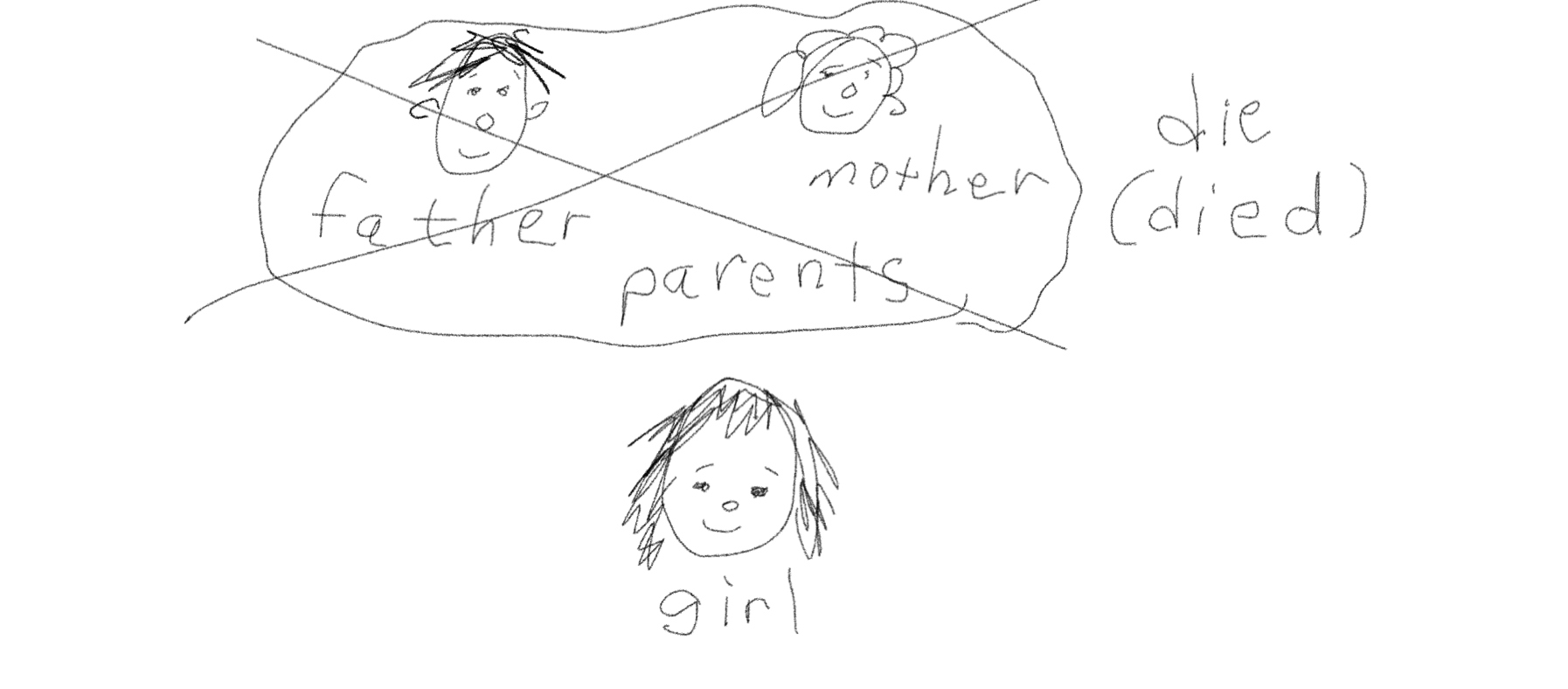How to use Prompters
How to Use Prompters (Novice Level)
Beniko Mason
11.6.2019
(link to the PDF of this article)
A Prompter is a list of words that helps the teacher tell the story. The Prompter helps the teacher remember to 1) keep track of the story and use the new language, 2) prepare ways of making the new language more comprehensible (“Comprehension-aiding supplementation”), and 3) add interest and depth to the story.
Preparing a Prompter in advance, frees the teacher to focus on the story. It allows the teacher the opportunity to determine if the students understand the story and gives the teacher the chance to supply the right assistance when needed.
Simple ways of doing Comprehension-Aiding Supplementation include (1) visual supplementation, which includes drawings, facial expressions (e.g., surprise, sleepy, angry, happy, etc.), and physical movements (walk, run, sit, crouch, hide, etc.). (2) linguistic supplementation, such as writing the words on the board, rephrasing using simpler words (synonyms), and providing occasional translations, and (3) taking advantage of the students’ knowledge of everyday life.
Not every word in the story should be included in the Prompter, and not every unfamiliar word in the Prompter needs to be made 100% comprehensible. The goal is only that the story becomes reasonably clear and makes sense. It is important that the teacher should not become too ambitious, and try to include too many new words. Using too many unknown words with Comprehension-Aiding Supplementation will overwhelm the students, disturb the flow of the story and prevent the story from providing context that helps make unfamiliar words more comprehensible.
The goal of the use of the Prompter is not full mastery of prompted words; Students gradually acquire the full meanings of new words as they hear and read them again and again. The purpose of the use of the Prompter is to remind the teacher to include certain items in the presentation of the story, as well as provide supplementation to help comprehension of the story. Prompted items may include language the students already know, or they may be the items the students are meeting for the first time. Students are different, and the teacher cannot know precisely what kind of background they have had in their language studies before their coming to class.
The following is an example of how a Prompter is used at the novice level, the simplest application. It is not a script to be followed but is presented here as an example of what a teacher might do.
In this case, we assume that the student had heard and had understood several stories before this one, stories that also began with “Once upon a time,” which had been explained already.
Here is the start of the story:
“Once upon a time there was a little girl. She was an orphan: Both her parents had died. She was very poor. She had no home and little to eat, only a piece of bread. A nice person gave her a piece of bread. She had only the clothes she wore.”
The first three sentences contain 18 words and three of these words are assumed to be unfamiliar and are prompted: orphan, parents, and died. As we shall see, several familiar words are also prompted, including some that are not in the story.
The SL teacher, of course, starts with the first sentence. “Once upon a time, there was a little girl.” Even though the word, “girl” is already known, it is a good idea to prompt it and draw a picture. This picture will be useful later on when dealing with the unfamiliar word “parent.” The teacher draws a picture of a girl – just a face, without the body and legs. The drawing should be done quickly; the teacher should not take the time to draw an elaborate picture.

Students at this level will also know the word “little ,” but there is no harm in providing context in the form of gestures or pictures, e.g. draw a big girl and a little girl, crossing out the big girl or use hand gestures to represent “little” as contrasted with “big.”

The next word on the prompter list is “orphan.” In order to introduce this word, the girl must have parents who die. So, the teacher introduces the words mother and father, and draws their pictures above the picture of the girl. Again, even though the words, “mother” and “father” are already known, it will be useful to write them, as we will see a little later.

The teacher then says, “The little girl had a mother and a father” and writes “mother” and “father” under the pictures, with lines leading from the mother and father to the girl, and says: “They were the girl’s parents.” The teacher writes “parents” under the words, “mother” and “father.”

The teacher then writes, “died” and says: “Her mother and father died.” The teacher crosses out the parents’ faces and says, “They died.” The teacher gestures someone’s death and looks around the class to make sure that the students understood that the parents died. Usually, students gasp.

The teacher then says: “Mother and father died, so she is now an orphan.” The teacher then writes “orphan” on the board.

Before continuing, here is a brief review of some important points:
- The Prompter may include words not in the story in order to help drawing unfamiliar words.
-
The Prompter may include words students already know. (Some may be only partially acquired: In these cases, the additional prompting may increase the level of acquisition.)
Here is the next part of the story:
“She was very poor. She had no home and had little to eat, only a piece of bread. A nice person gave her the piece of bread. She had only the clothes she wore.”
Prompter list is: poor, home, eat, little to eat, a piece of ~, bread, nice, clothes, wore.
The teacher continues; “The girl was poor. She had no money. She did not have any money. She was very poor.”
Most students will know what “money” is, but there is no harm in drawing a $ sign along with a few coins and paper money (e.g. dollars).

The teacher continues: “She did not have a house. She did not have a home. She had no home.” The teacher draws a picture of a “house.” She writes down, “house” under the drawing.. The teacher draws a big cross on the house, and says, “She had no home.” The teacher writes, “No home” under the house with a big cross on it. There is no need at this stage to explain the difference between “house” and “home,” unless a student asks. (The teacher has prepared an answer, such as “A house is a real building. A home is a house that belongs to somebody….”).

In the story, a kind person gave the girl a piece of bread; the teacher can introduce the kind person before introducing “She had nothing to eat.” She then creates a separate scene: “One day, a man came to her.” She draws a picture of a man approaching the girl.

The teacher says, “A man gave her bread. He gave her a piece of bread.” The teacher draws a picture of a man giving her a piece of bread. The teacher writes down, “give” and “gave.”

The teacher says; “The little girl said “thank you” to the kind man. He was a kind man. He was a nice man. Now she had a little to eat. Before she had nothing to eat, but now she has a little to eat.”
The teacher gives synonyms for “kind” and “nice” (e.g., good, e.g. friendly) and/or a translation.

The teacher points at the house with a big cross on it, and uses the word, “orphan” again, “She was an orphan. She had no parents. Also, she didn’t have a house. She had no home. She had no place to live.” The teacher writes down, “no place to live” under “no home.”

The teacher continues: “The girl was wearing one skirt, one shirt, one jacket, and one hat.”

“They were the only clothes she had. She wore a skirt, a shirt, a jacket, and a hat. She did not have a sweater.” The teacher draws these clothes, labels the drawing “clothes” and may point to those wearing these clothes in the class.

Note that the teacher presents words that students might already know, leading to fuller comprehension and acquisition. The students may already know the word “clothes” but because it is very important to the story, the teacher provides more supplementation and more and deeper information about the word.
How to Use Prompters (Upper-Levels)
At the beginning level, visual supplementation plays a major role. At more advanced levels, however, input is more linguistically complex, and topics are less concrete, and more linguistic supplementation is used. Stories at this level are longer and require more imagination and often make a deeper emotional connection. An upper-level story sometimes lasts as long as 40 to 50 minutes, or even 80 minutes. Preparations for upper-level stories is therefore different from preparation for beginning level lessons.
Specifically, 1) The teacher will look for longer and more complex stories, which means the Prompter list will become longer; 2) It will take more time to prepare the story; 3) It will take more time to tell the story; 4) The words on the list will be more difficult to explain; 5) It will become more difficult to remember the flow of the story; 6) The story will be more complicated: it will be divided into chapters or acts, possibly with a number of characters, and more complicated events. The teacher will have to remember who the characters are and what the important events are, and all this will require more rehearsal than for beginning level stories.
“Easy to tell Stories” is not determined by the length of the texts
Many stories are written from around 1,500 to 2,500 words, although some stories are over 4000 words. “Short,” however, does not always mean “easy.” Some “short stories” contain a high percentage of challenging words. I use the story “Strong Hans” with more advanced college students of English in Japan. It contains 2616 words. My prompter list for this story contains 197 items (Appendix 1)! I don’t provide Comprehension Assisting Supplementation for each word when I tell the story, but there is a great deal of new language in this relatively short story. As noted earlier, it is not a good idea for the teacher to become too ambitious in introducing new words.
The Key Words in the Prompter
We now review the use of the Prompter in stories well beyond the novice level. Students at this level have not only heard many stories, but have also been engaged in Guided Self-Selected Reading (Mason,2019) for at least two years, which means they have acquired a considerable amount of vocabulary and grammar, as well as information.
As was the case with stories at the novice level, the Prompter helps the teacher to remember to 1) keep track of the story and use the new language, 2) Prepare ways of making the new language more comprehensible (“Comprehension-aiding supplementation”) which will help make the story more comprehensible and aid in the gradual acquisition of the new items, and 3) Add interest and depth to the story. Here is an example from. “Mosquito,” a story from Asia. This story is about concepts such as hard labor, true love, deception, falsehood, betrayal, secret, trust, fidelity, frivolousness, obedience, false expectations, respect, wisdom, and cruelty. Students understand what these words mean from hearing the explanations of the words and from the context provided by the story, and from their personal experiences.
“There was a young couple who were poor farmers. The husband loved his wife, and he worked hard to improve their station in life. He was kind to her and not demanding. His love for her was genuine. His wife was young and pretty, but she was a coquette.”
The prompter words in this case are “station in life,” “demanding,” “genuine,” and “coquette.”
These words can be explained using synonyms, explanations, and descriptions. Here is what the teacher might say for each of the prompted words listed above. As usual, the explanation is in the target language, but translation can be used when helpful.
Station in life: the husband worked hard. He worked hard to make money, from early morning till late at night, because they were poor. They were dressed poorly. They could not go to nice places because they did not have money, but they were also in a lower class. He wanted to climb up the class ladder. He wanted to join the group of people that were above his class. In Japan, there were four different social classes: the highest class was the warriors, the second was the farmers, then the craftsmen, and the lowest class was the tradesmen. (The teacher can illustrate this with a diagram on the board.) He wanted to go to a higher social class. He wanted to improve their station in life. “Station” here does not mean a train station. It means the position in the society: the rank, the social class.
Demanding: He did not tell his wife to do many things. He did not expect her to do many things for him. He did not say, “Make breakfast!” “Bring me tea!” “Clean the house!” “Work hard!” He did not ask her to do many things for him. He did not demand much. He was not demanding.
Genuine: He loved her very much. He did not look at other girls. He did not flirt with other women. He did not want other girls. He loved her truly. His love was true. His love for her was genuine.
Coquette: His wife was a dishonest woman who tried to get men’s attention and loved using her physical beauty to attract men. Her love for her husband was not genuine. She winked at men when her husband was not watching. She liked men. She was a coquette.
Cultural and historical information in the Prompter
Most of the stories used in the SL lessons are stories from other countries where the background cultures are different from the culture of the students. Some explanations are often necessary as some of the words demand clarification of the customs in that country.
For example, in a short story, “Cat Woman,” the Greek Goddess, the character “Aphrodite,” needs to be described. Cat Woman can be found in the appendix and at: http://www.storyarts.org/library/nutshell/stories/catwoman.html
Many western stories mention Christianity, and use the words like “Baptism” and “Water needed for Christening.” “William Tell” is about a man who freed Switzerland from Austria” (In the year 1307). “Daniel in the Lion’ Den” is a story from 2300 years ago (323-30 BC) about jealousy and religious belief. The purpose of stories in Story Listening sessions is not to teach culture, morals, or any belief system, but with upper-level SL lessons, some explanations and comments on these topics are helpful for comprehension.
It often takes more than 40-minutes to tell a story at the upper-level SL lesson; it also takes more time to prepare and more effort to deliver the story. It requires more knowledge of the rules of the language when the students start asking questions. For an advanced class, linguistic supplementation is the most often used, and drawings are seldom used. The rate of speech is almost at a normal speech rate, and the teacher often inserts her comments on the events and characters in the story. Stories for advanced students are often very interesting for the teacher, but at the same time they require more effort.
References
Grimm Brothers’ Household Tales: http://www.gutenberg.org/files/2591/2591-0.txt
Krashen, S., Mason, B., & Smith, K. (2018). Some new terminology: comprehension- Aiding supplementation and form-focusing supplementation. Language Learning and Teaching, 60(6), 12-13. Mason, B. (2019). Guided SSR before self-selected reading. Shitennoji University Journal, 6, 445-456.
Appendix 1: A Prompter prepared for Japanese college students for “Strong Hans”
- quite alone かなりひとりぼっち
- solitary 孤独な
- valley 盆地、谷間
- It came to pass that ~〜が起こった
- branches of fir もみの木の枝
- take pleasure in ~ 〜するのが楽しい
- go further もっと遠くに行く
- onwards 前方へ
- robber(s) 強盗
- spring out of 〜から飛び出る
- thicket 雑木林
- seize 掴む
- carry ~ far away 遠くに連れて行く
- black forest 黒い森
- from one year’s end to another 一年中
- urgently 執拗に
- beg 頼む、懇願する
- set ~ free 〜を自由にする
- made of stone 石で出来ている
- entreaty 懇願、嘆願
- by force 力ずくで
- bushes and briars 低木やいばらの茂み
- passage 通路
- sword(s) 刀
- sabre (saber) 軍刀、サーベル
- deadly weapon(s) 命取りの武器
- gleam 薄明かり
- gamble 賭け
- captain 首領
- at the head of ~ 〜の頭に
- be at ease 安心する
- fear 恐れる
- look after 面倒を見る
- housekeeping 家事
- fare ill with ~ 〜にとって巧くいかない
- thereupon そのあとすぐに
- knight(s) 騎士
- cave 洞窟
- club こん棒
- out of a branch of fir もみの木の枝から
- hide (hid) 隠れる
- silent 静かにしている
- moreover そのうえ、さらに
- godless 罪深い
- robbing expedition 強盗するための遠征
- box 拳で打つ事
- hold his tongue 黙る
- stout strong clubどっしりした強いこん棒
- vigorous box 強力なげんこつ
- full of admiration for ~ 感心で満ちて
- bravery 勇敢さ
- strength 力
- in earnest 真剣に
- entrance-door 入り口
- fetch とってくる
- darkness 暗さ
- daylight 昼の光
- a couple of hours 2時間
- doorway 出入り口
- regard ~ as dead 死んだものとみなす
- a head taller than 頭一つ〜より背が高い
- crack 鋭い音をたてて裂ける
- cellar 穴倉
- God save us! 神よ助けたまえ!
- Don’t let that turn your hair grey 心配するな
- bullock(s) 去勢した雄牛
- draw 引っ張る
- crunch and crack バリバリがんがん
- fir-tree もみの木
- wound round 周りを絡み付かれた
- like a rope 綱のように
- from the bottom to the top底から頂上まで
- upwards 上に向かって
- faggots 鉄棒の束
- Fir-Twister もみの木をよる
- knock and hammer ぶち当てたり打ったり
- shake at every stroke 一撃ごとに揺れる
- giant 巨人
- fist 拳
- vermin 有害小動物
- sniff 鼻を鳴らして匂いをかぐ
- snuffle 鼻をクンクン言わせる
- Rock-Splitter 岩を分割する人
- consented 承諾する
- roam 放浪する
- wild beast(s) 野生の獣
- terrified 怯える
- deserted castle さびれた城
- thorn(s) とげ
- bramble(s) とげのある低木
- boar 去勢しない雄ぶた(猪)
- spit 焼きぐし
- roast 焼く、あぶる
- nine pounds of meat 9ポンドの肉
- be busy cooking 料理で忙しくする
- shriveled-up 縮んで小さくなった
- mannikin 小人
- Be off あっちへ行け
- sneak 下劣な
- imp 小鬼
- insignificant 取るに足らない
- dwarf こびと
- belabor くどくどと述べる
- defend 防御する
- gasp for breath 息を求めて喘ぐ
- thoroughly 徹底的に
- vent ~ on ~ 〜に〜を発散する
- anger 怒り
- ill-treated by ~ 〜によって虐待される
- willing 喜んでする
- clearly 疑いも泣く
- suffer 苦しむ
- skimシチューの鍋から油をすくい取る
- pan 鍋
- without more ado 余計な事は言わずに
- demand 要求する
- a piece of meat ひとかけらの肉
- wretch 哀れな奴
- share 分かち合う
- hand 手渡す
- a bit 少し
- devour がつがつ食べる
- asked for 欲しいという
- good-natured やさしい
- content with 〜に満足する
- for the third time 三回目に
- shameless 厚かましい
- malicious 悪意のある
- treat 扱う
- wrong man 人違い
- exert much 尽力する
- blow(s) 強打
- castle step(s) 城の階段
- be about to 〜しようとする
- run after~ 〜の後を追う
- fall right over ころぶ
- flat on his face 顔を打つ
- slip into 滑るように入る
- mark 印をつける
- spot 場所
- no longer もはや〜ない
- conceal 隠す
- served ~ right ざまあみろ
- mean さもしい
- disgrace 恥
- basket かご
- rope 綱
- grin at にやっと笑う
- bound with~ 〜で縛られる
- chains 鎖
- mournfully もの悲しそうに
- felt great pity for 〜を気の毒に感じる
- think to oneself 考える
- deliver ~ out of ~ 〜を〜から救う
- wicked 邪悪な
- fall down dead 転げ落ちて死ぬ
- immediately 即座に
- enraptured with ~ 〜にうっとりする
- her beauty 彼女の美しさ
- savage 残忍な
- count 伯爵
- steal ~ away さらう
- imprison 牢屋に閉じ込める
- watchman 警備員
- suffer misery 惨めさで苦しめる
- vexation enough 十分イライラさせる
- trust 信頼
- false 偽りの
- design against ~ 〜に対しての悪巧み
- out of the depths 奈落から
- counsel 相談
- backwards and forwards 行ったり来たり
- ring 指輪
- sparkle 光る
- turn round 回す
- rustle さらさらという音が立つ
- spirits of the air 空気の霊
- hover above ~ 〜の上を空中を舞う
- struck dumb 驚いて何も言えない、唖然とする
- obey 従う
- on the sea 海上
- perceive 気がつく
- faithless 不誠実な
- comrade 仲間
- in fierce anger すざましい怒りで
- leap (leapt) 跳ねる、跳ぶ
- weigh 重さを量る
- drag 引きずる
- drown 溺れる
- in the very nick of time 間一髪で
- bear 運ぶ
- as swift as ~ 〜ほど速く
- lightning 稲妻
- merit (非難などに)値する
- in the greatest alarm 非常に危機を感じて
- rejoice 大喜びする
- exceedingly 抜群に
Appendix 2
Cat Woman http://www.storyarts.org/library/nutshell/stories/catwoman.html A Tale from Greece There was once a man who had a beautiful cat. She was so loving that one day he wished out loud, “Dear Cat, if you were only a woman, I’d marry you!” Aphrodite, the goddess of love, heard his wish and changed the cat into a beautiful woman. The man and the cat woman were married and lived quite happily together until one night . . . The beautiful woman was sitting on her bed and into the room came a mouse. She crouched on her hands and knees, pounced on the mouse, and began to eat it, much to her husband’s alarm! Aphrodite looked down from the clouds and, seeing this, turned the woman back into a cat. Aphrodite chuckled, “I can change the outer appearance of a creature, but to truly make a difference, I guess I must change its inner character first!”